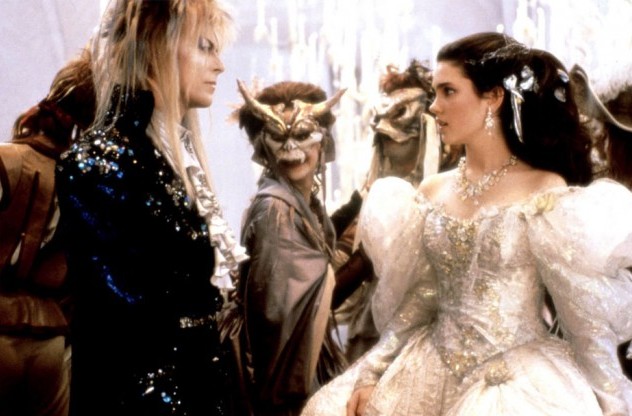No one imagined that when Jim Henson’s Labyrinth came out in 1986, it would turn out to be a huge box office disappointment. Like its somewhat more terrifying predecessor, The Dark Crystal, it developed a cult following that courses on today. (Don’t believe me? Then check out the fan fiction.) As a child, I loved it. It was dark, but also irreverent. With most of the characters being acted by brilliant puppeteers, it was fantastical beyond animation. And what young girl wouldn’t be enamored with David Bowie channeling a Victorian Goth, vampire pirate as Jareth, the Goblin King?
While I liked the whimsy of this film as a child, watching it as a teen, I found myself identifying with Sarah. I’ve always felt that Labyrinth is more than a simple coming-of-age story or fairytale. For me, Labyrinth is a becoming-a-woman story—one to draw lessons from.
First of all, for those of you unfamiliar with this ‘80s gem, Sarah starts the film as a dramatic 15-year-old who resents her stepmother and the fact that she’s always expected to watch her baby brother. When we first see her, she’s practicing lines from a play about a Goblin King stealing a child, but can’t remember the final line. (This gets important later.)That evening, upset by her plight in life, she picks up baby Toby and says she wishes that the Goblin King would come and take him away. Enter David Bowie in pants tight enough to make Amy Schumer blush. No, really.
Sarah’s all like “Look, I didn’t mean it. I was just standing here talking shit.” And Jareth is all, “Whatever, you said it. I did it. And now, you have thirteen hours to make it through my wicked hard maze and if you fail, I’m turning this kid into a muppet – I mean a goblin. Sorry, not sorry.”
So, Sarah embarks on a very traditional hero’s journey full of obstacles, making several indispensable friends along the way. And after persevering, she completes her task, saves her baby brother, and learns that she must grow up and start taking responsibility for her actions. Badda bing, badda boom, right? Mmmm, sort of.
When you start paying attention to Sarah’s relationship with Jareth throughout the movie, it’s much more complex than meets the eye. He’s more than just a villain. If this is about Sarah coming into womanhood, in the very first scene she’s like a little girl playing dress up in her old timey, oversized costume. Her room is full of stuffed animals and trinkets. Yet she’s on the cusp of something. In the labyrinth, even though it seems like she’s at the mercy of Jareth, she’s finally taking charge and making her own decisions. She’s forced to. And when Hoggle betrays her and gives her the magic peach, she dreams of an adult masquerade ball, where she fills out a gown without trouble. She is a woman, being watched by Jareth, and she’s watching him in return. Watching and wondering. But she becomes discombobulated because she still doesn’t quite fit in there, either.
And while part of me always thought it was pretty creepy that the Goblin King was blatantly lusting after this girl-not-yet-a-woman, it makes sense in this coming of age reading — and it makes Sarah a total badass. Because Jareth represents the sexual temptation that comes hand in hand with menses, growing boobs, and all those super fun (read: agonizing) moments that lead up to the time when you’re a woman — and what Sarah ends up saying is, “Whoa, life. Back that shit up.”
How do fairy tales usually end? Let’s see. Cinderella marries Prince Charming; Beauty marries the Beast, who also conveniently turns out to be a prince; Ariel grows legs and marries Prince Eric; and the list goes on. In Labyrinth, Sarah is also offered marriage and a kingdom. She could, like others did before her, go right from parents to husband, escaping a wicked stepmother by running to the arms of a wealthy suitor. Jareth even tries some psychological sorcery, telling her that his shenanigans were all for her and that he’s exhausted trying to please her high maintenance ass. Typical.
Instead of dealing with his condescending, otherworldly bullshit, Sarah chooses herself. To loosen her grip on childhood a little, yes, but not to rush into adulthood before she’s ready, like so many do. “You have no power over me,” she says, remembering the last line of the play and scattering Jareth into a pile of ruffled clothes that morph back into an owl. But he never quite disappears. He watches from outside her window while she celebrates the victory with new friends. He’s there as an ever-present reminder of the danger of losing ourselves in others before we’ve discovered the power of our own potential.
And now for David Bowie in tight pants, dancing with muppets.
Header image via Lucasfilm/Jim Henson Company


